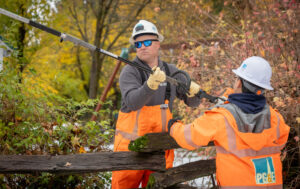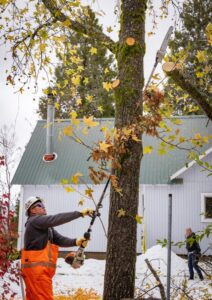Round Mountain – As California confronts more severe storms and rising fire threats, IBEW 1245 union member and Safety Infrastructure Protection Team (SIPT) Lead Robert McKenzie and his SIP Technicians are on the front lines.
The SIP Team is part of a union-company initiative that created the new SIPT job classifications. The purpose: to enhance PG&E’s arsenal for mitigating risk to life and property by taking proactive measures.
Background
In fall of 2018, then PG&E COO Michael Lewis contacted IBEW 1245‘s Bob Dean for some help. Having experienced catastrophic wildfires over the past 4 years, PG&E wanted to negotiate a new job classification that would address fire safety, both proactively and in the field at base camps during large emergency events. But the Union representing firefighters in California mistakenly viewed the creation of a new classification as a threat to their job security. Lewis wondered if IBEW 1245 could reach out and help ease the tensions.
“Shortly thereafter, the Bobs (Dean and Gerstle) sat down with Brian Rice, the president of the California Professional Firefighters Federation. Over a two-hour lunch we assured Rice that PG&E would in no way have this job classification fighting fires. The sole focus was about public and employee safety, nothing more,” declared IBEW 1245 Sr. Assistant Manager Bob Gerstle. As a result, the SIPT classifications were born in 2019.
Robert McKenzie & Crew: Supporting Line Crews & Fire Fighters
Enter Robert McKenzie. A certified Emergency Medical Service provider and veteran fire fighter, McKenzie is the PG&E Crew Lead for the Safety Infrastructure Protection Team (SIPT) headquartered out of Redding, California.
“In the EMS emergency services, there’s Basic Life Support (BLS) or Advanced Life Support. I can’t give drugs or poke needles, but we have a full complement: we have backboards, we have oxygen, we have heart monitors… we have a burn kit, and a spinal kit,” said McKenzie.

Safety Infrastructure Team Crew Lead Robert McKenzie cuts a limb after a storm.
During the recent storms which battered northern California, McKenzie and his SIP Team were on standby, ready to provide Emergency Medical Services (EMS) on an as needed basis to crews working the storms. As line crews worked around the clock to clear downed wires, repair broken infrastructure, and restore power for countless families across northern California, McKenzie and his SIP partner provided an extra layer of protection.
“Our number one thing is, God forbid, if one of these guys would get hurt, we have a radio. So, say phones were down, we actually have a fire radio. We can make an emergency call and get someone out here,” McKenzie said.
The work is especially vital in remote locations when crews work in life threatening situations such as storms and fires and far away from full-service hospitals. If a crew member suffers a medical event or serious injury, minutes can make the difference.
“We always say {there} is the golden hour for trauma. If someone gets hurt, you want to get ’em to from where they’re hurt to a hospital within an hour,” he said. “And a big part of that would be packaging that patient and getting them out where an ambulance can get them. We have all the equipment. We can actually have them packaged, loaded up in our truck, brought down here to the main road, meet an ambulance and just expedite that even more,” McKenzie added.
When the standby team is not ministering to crews, they are helping clear vegetation, cut trees and create paths so crews can access trouble spots. For large parts of the year, they contribute to fire mitigation and grid hardening, as part of the Asset Risk Reduction Program.
The work is critical. “The main goal of the program is to minimize risk,” said McKenzie.

Safety Infrastructure Team Crew Lead Robert McKenzie
During fire season, SIP Teams work as advance teams to fortify defense systems in the fire’s path. “We’ll go out ahead of the fire in an area. We go to that area, and we’ll actually clear around the poles. Then our trucks come in equipped with a three-tank system that has water and retardant; we mix it, and can actually treat the poles with the type of retardant so when the fire front does come through there, the poles are protected from fire,” McKenzie shared.
The effort saves lives, infrastructure and money. McKenzie brings extensive experience to the task. In addition to his twelve years as a captain in the volunteer fire department in Mendocino County, McKenzie has worked the Park Fire in Chico, the Basin Fire out of Fresno, the Lake Fire in Santa Maria and Dixie Fire near Canyon Dam. In each case, he prepared the terrain, protecting hydro facilities, substations, and in one case, an MC yard.
“We all have fire experience, so we know how to clear stuff away from the building, get it to where it’ll either stand on its own or we can stay there with our water on and protect it when the fire comes,” he said.
The Union Difference
Prior to joining the Union and pursuing his career at PG&E, McKenzie worked at a construction company, running heavy equipment and driving trucks. He rose to the rank of Capitan in the volunteer fire department.
Why the switch to PG&E?
“Honestly, it was the benefits…the pay and the career. I went from having a job to having a career. And I feel that PG&E is a career versus a job because the Union’s there,” said McKenzie. “They fight for us, make sure we have the best benefits, make sure we have the best pay, make sure all of our safety equipment’s up to par.”
McKenzie is an active IBEW 1245 union member and Shop Steward.
“{Once} my fire jacket was old and kind of tattered. I made a phone call, and 10 minutes later an email: my new jacket was coming, being shipped to me. And so I think that’s big. The union’s big on keeping all of its members safe.”
IBEW 1245 Business Representative Steve Lange lauded McKenzie, reinforcing his message on the Union’s commitment to safety. “Our SIPT members are there to protect the company’s assets,” declared Lange, “and the most important asset the company has is our members.”
- Eileen Purcell, Sr. Advisor, with contributions by Sr. Assistant Business Manager Bob Gerstle; Photographs by John Storey